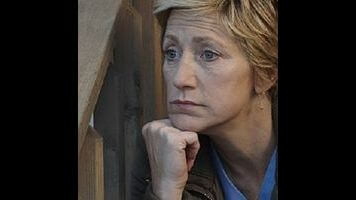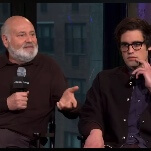Nurse Jackie: "Pilot"

On paper, Edie Falco's Jackie Peyton sounds a lot like the nursing equivelant of Hugh Laurie's Dr. Gregory House: both are sly, curmudgeonly, uniquely gifted medical professionals who also happen to be addicted to painkillers. But Nurse Jackie doesn't seem interested in creating another medical Sherlock Holmes. The show's focus is Jackie first, hospital and all its myriad employees and patients second.
Which is why, in practice, Nurse Jackie Peyton reminds me of another recent television antihero, Mad Men's Don Draper. Both are two-faced, sure—adept at slipping their wedding bands on or off at just the right moments. Like Don, Jackie is a cool, unruffled, domineering surface pulled tightly to cover the knotty, tangled mess of secrets and emotions beneath. Both self-medicate—Don with booze and sex, Jackie with dreamily shot, floating granules of painkillers, supplied to her by her pharmacist/lover. And most importantly, like Don, Jackie is a murky swirl of ambiguity. Even though she speaks directly to us via voiceover, you get the feeling that you never know quite what she's thinking. She's a highly unknowable character, which, especially at the outset, makes for a pretty mesmerizing one.
At times in the pilot Jackie is, like her nursing student Zoe tells her, "a saint,"—or at least Robin Hood. She steals from a rich diplomat degenerate and gives to the poor pregnant girlfriend of a young, dead bike messanger. She makes good from bad by forging the dead bike messenger's organ donor card, and later by flushing the diplomat's ear down the toilet. But, of course, even saints are (or were at one point) human, and God himself can be (as Jackie reminds Zoe) "an asshole," which is why thirty seconds after Zoe calls Jackie a saint, the saint almost kills a patient by giving him the wrong IV. It's also why Jackie can spoon (seemingly) with love on the cot in the break room with the pharmacist, while at the same time have a (seemingly) loving husband making her pancakes at home.
But Jackie isn't the only reason to watch Nurse Jackie. There's a lot to like here: From the slow, woozy rain of painkiller granules, to the fuzzy haze of Jackie's world post-bump, the show just looks really good. And although it's overshadowed by the drama, the "edy" side of this dramedy is definitely there too—especially whenever Peter Facinelli was on screen. The clueless, uninsure-able, egotistical, inappropriate-touching-tourette's-having Dr. "Coop" Cooper is the role that Facinelli was clearly born to play. His line-reading of "[laughing] Chocolate milk," should be studied by all comic actors gearing up to play "laughable asshole." It was perfect. Jackie's cheery, chatty, nursing student Zoe (Merritt Wever) was also thoroughly enjoyable.






















![HBO teases new Euphoria, Larry David, and much more in 2026 sizzle reel [Updated]](https://img.pastemagazine.com/wp-content/avuploads/2025/12/12100344/MixCollage-12-Dec-2025-09-56-AM-9137.jpg)

















